 |
|
| |
|
Fourth
meeting of the Ad hoc Open-ended Working Group on
Access and Benefit-sharing of the Convention on Biological
Diversity |
|
30 January -
3 February 2006 | Granada, Spain
|
|
|
|
|
|
Highlights
for Monday, 30 January 2006
|
|
|
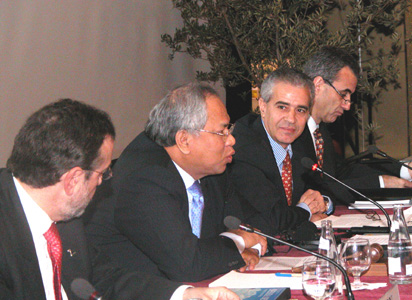
|
|
The fourth meeting
of the Ad hoc Open-ended Working Group (WG) on
Access and Benefit-sharing (ABS) of the
Convention on Biological Diversity (CBD) opened
on Monday, 30 January, in
Granada
,
Spain
. In a morning plenary, delegates heard opening
statements and reports, and addressed
organizational matters. A Committee of the Whole
was established, which met in the afternoon to
initiate negotiations on an international regime
on ABS.
Above photo
L-R: Antonio Serrano, Spain’s Secretary General for
Lands and Biodiversity;
Suboh Mohd Yassin (Malaysia);
Ahmed Djoghlaf, CBD Executive Secretary;
and Olivier
Jalbert, Secretary of the Meeting.
|
|
|
|
|
|
|
OPENING PLENARY:
|
|
|
|
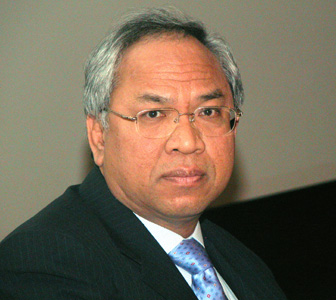 |
|
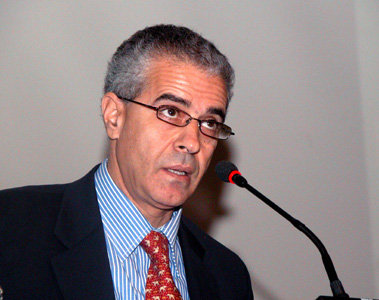 |
|
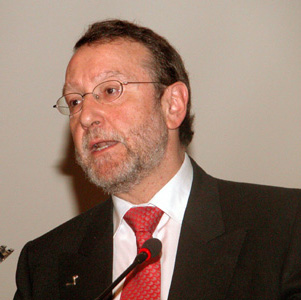 |
|
|
|
|
|
|
Suboh
Mohd Yassin (Malaysia), on behalf of the President of the CBD Conference of
the Parties (COP), opened the meeting, calling for
significant progress in the negotiations on an
international ABS regime before COP-8.
|
|
Ahmed
Djoghlaf, CBD
Executive Secretary, noted that the limited progress
in operationalizing the benefit-sharing pillar of the
Convention is generating legal uncertainty and impacts
on long-term investment. He hoped that the meeting
will be a breakthrough in forging a partnership with
present and future providers and users of nature, to
contribute to poverty alleviation, peace and security.
|
|
Antonio
Serrano,
Spain’s Secretary General for Lands and Biodiversity,
said a binding international regime on ABS would
contribute to biodiversity conservation, poverty
alleviation and biotechnology development. |
|
|
|
|
|
ORGANIZATIONAL MATTERS:
|
|
|
|
|
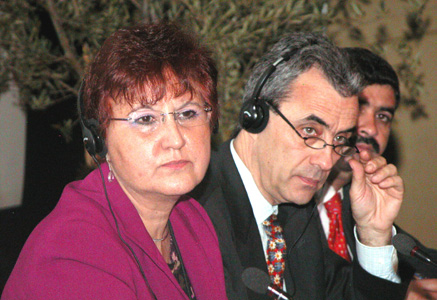
|
|
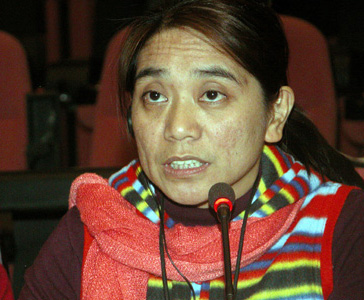
|
|
|
|
|
Delegates
elected Margarita Clemente (Spain), as WG Chair; Antonio
Matamoros
(Ecuador) as Rapporteur; and confirmed the COP Bureau as WG
Bureau.
Above photo L-R: Margarita Clemente (Spain), WG Chair of ABS-4; Olivier Jalbert,
Secretary of the Meeting; Antonio Matamoros
(Ecuador), Rapporteur.
|
|
The
INTERNATIONAL INDIGENOUS FORUM ON BIODIVERSITY (IIFB)
recommended that the Article 8(j) WG elaborate the
elements of the regime relevant to the protection of
traditional knowledge, and requested the creation of
an advisory group to review progress in the
negotiations and provide expert advice to the ABS and
Article 8(j) WGs.
Above photo: Lourdes Amos (IIFB)
|
|
|
|
|
|
STATEMENTS:
|
|
|
|
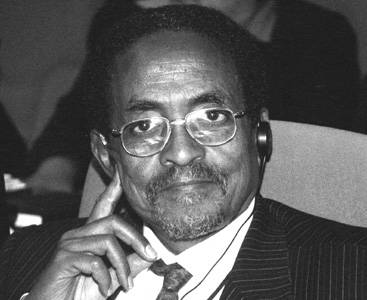 |
|
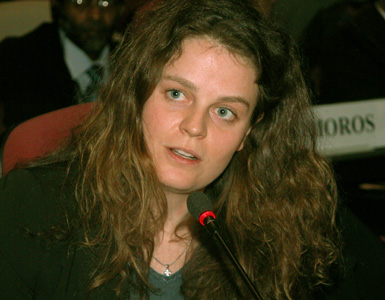 |
|
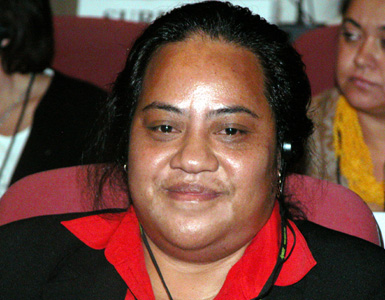 |
|
|
|
|
|
|
Ethiopia,
on behalf of AFRICA, stressed that the ABS regime must
be legally binding, and suggested using the draft
protocol text submitted by
Ethiopia
and endorsed by
Africa
as a basis for negotiations.
Above photo: Tewolde Berhan Gebre Egzhiaber
(Ethiopia) |
|
Austria,
on behalf of the EU, suggested focusing on: narrowing
down the list of options developed at ABS-3; achieving
mutual supportiveness between the regime and existing
international agreements and processes; and addressing
the participation of local and indigenous
communities.
Above
photo: Cosima Hufler (Austria on behalf of the
EU)
|
|
Kiribati,
on behalf of ASIA AND THE PACIFIC, stressed the need
for: a coordination mechanism between the ABS and
Article 8(j) WGs; a mandatory regime to avoid
biopiracy; and a COP-8 recommendation to the Global
Environment Facility to support ABS activities.
Above photo: Terei Abete-Reema (Kiribati) |
|
|
|
|
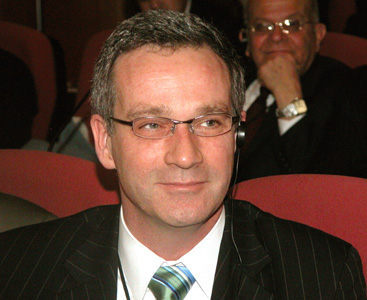 |
|
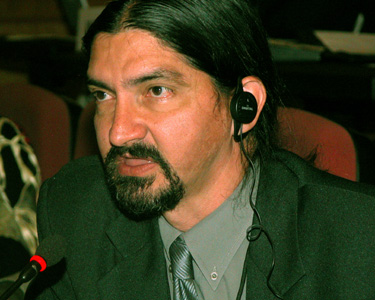 |
|
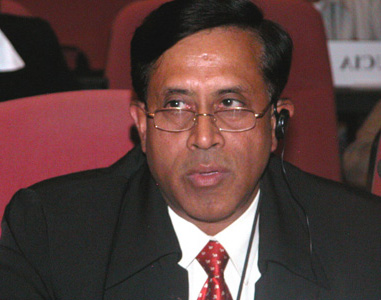 |
|
|
|
|
|
|
Canada, on behalf of JUSCANZ, expressed their will to work
towards a positive outcome, based on enhanced
understanding and respect for one another’s vision.
Above photo: Timothy Hodges (Canada) |
|
Venezuela, on behalf of LATIN AMERICA AND THE CARIBBEAN,
reiterated the need to move from recommendations to
commitments, and recognized that the regime requires
binding elements and should ensure the protection of
traditional knowledge.
Above photo: César Molina (Venezuela) |
|
India, on behalf of the LIKE-MINDED MEGADIVERSE COUNTRIES,
prioritized clear definition of the elements of an
international regime, suggested that the regime should
reinforce the rights of indigenous communities, and
emphasized the role of national legislation in
regulating access to genetic resources.
Above photo: Desh Deepak Verma (India) |
|
|
|
|
|
|
|
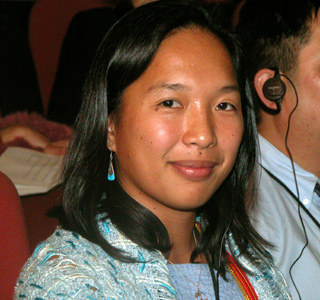
|
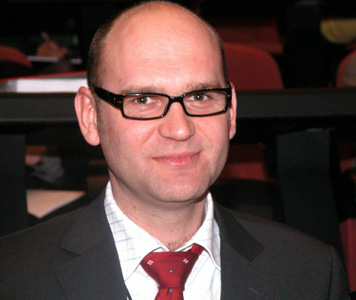
|
|
|
|
The IIFB
recommended that the international regime reflect
international human rights norms, include measures for
the repatriation of genetic resources and associated
traditional knowledge from ex situ collections
to traditional knowledge holders, and address
transboundary genetic resources and traditional
knowledge.
Above photo: Jennifer Corpuz (Tebtebba
Foundation) |
The
INTERNATIONAL CHAMBER OF COMMERCE highlighted the
interest of the private sector in the success of the
negotiations.
Above
photo:
Alwin Kopše (ICC)
|
|
|
|
|
|
REPORT
OF THE ARTICLE 8(J) WORKING GROUP:
|
|
|
|
|
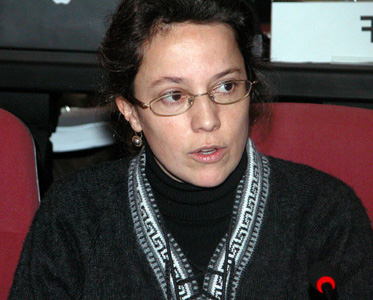
|
|
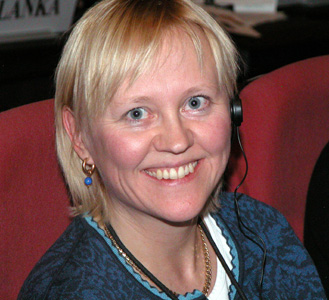 |
|
|
|
|
SPAIN
reported on the outcomes of the fourth meeting of the
Article 8(j) WG.
Above photo: Maria Teresa Martin-Crespo (Spain) |
|
NORWAY
supported calling for expanding the mandate of the
Article 8(j) Advisory Group to contribute to ABS
negotiations.
Above photo: Birthe Ivars (Norway) |
|
|
|
|
|
REPORTS
ON THE
BONN
GUIDELINES:
|
|
|
|
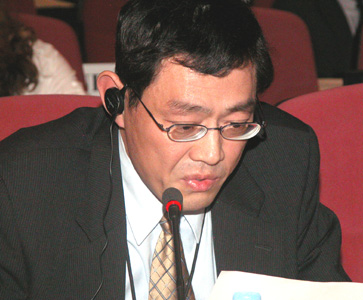 |
|
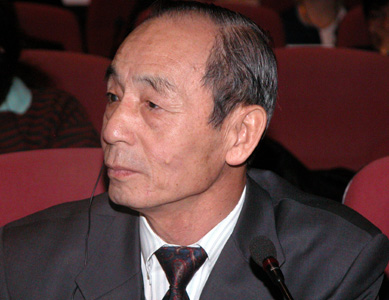 |
|
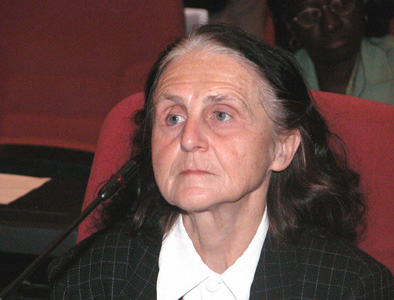 |
|
|
|
|
|
|
JAPAN
highlighted the completion of national guidelines on
user measures to support compliance with prior
informed consent and mutually agreed terms.
Above photo: Yukio Kawauchi (Japan) |
|
CHINA
reported on the integration of the Bonn
Guidelines in existing legislation and progress in
drafting a national ABS law.
Above photo: Cheng Weixue (China) |
|
The
CZECH REPUBLIC
underlined a national survey of ABS implementation and
supporting activities for ABS in the areas of
agriculture, forestry and botanical gardens.
Above photo: Milena Roudná (Czech Republic) |
|
|
|
|
|
INTERNATIONAL
REGIME ON ABS:
|
|
|
|
|
|
|
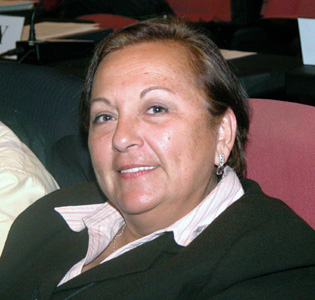 |
|
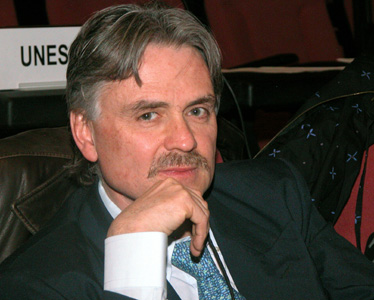 |
|
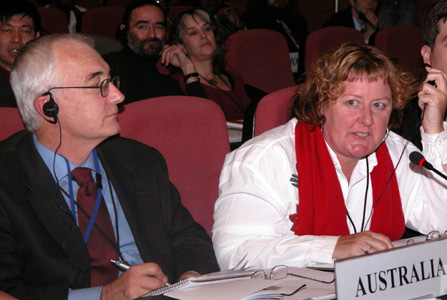 |
|
|
|
|
|
|
Cautioning
that chances to realize benefits are rapidly
diminishing, PERU
urged a focused and practical debate on a legal
mechanism to operationalize benefit-sharing.
Above photo: Maria Luisa Del Rio Mispireta
(Peru) |
|
SWITZERLAND
proposed a pragmatic approach identifying the needs
that must be met at the international level following
a gap analysis, and highlighted its proposal to the
World Intellectual Property Organization on the
determination of origin of genetic resources and
traditional knowledge, and the need to work on a
certificate of legal provenance.
Above photo: Robert Lamb (Switzerland)
|
|
AUSTRALIA
prioritized refining the scope of the regime and
narrowing down the options while seeking consistency
with other international instruments and institutions.
Above photo L-R: Geoff Burton and Anne Marie
Watt (Australia) |
|
|
|
|
|
|
|
|
|
|
|
|
|
|
|
|
 up to top
up to top |
|
|
|
|
| |
|
Related Links
|
|
|
|
|
| |
|
| |
|
|
|
|
|
| |
|
 Please
e-mail the
Digital Editor if
you have any questions regarding the content of this
page. Please
e-mail the
Digital Editor if
you have any questions regarding the content of this
page.
| Back to
Linkages home | Visit
IISDnet | Send e-mail to
ENB |
© 2006, IISD. All rights reserved. |
|






















